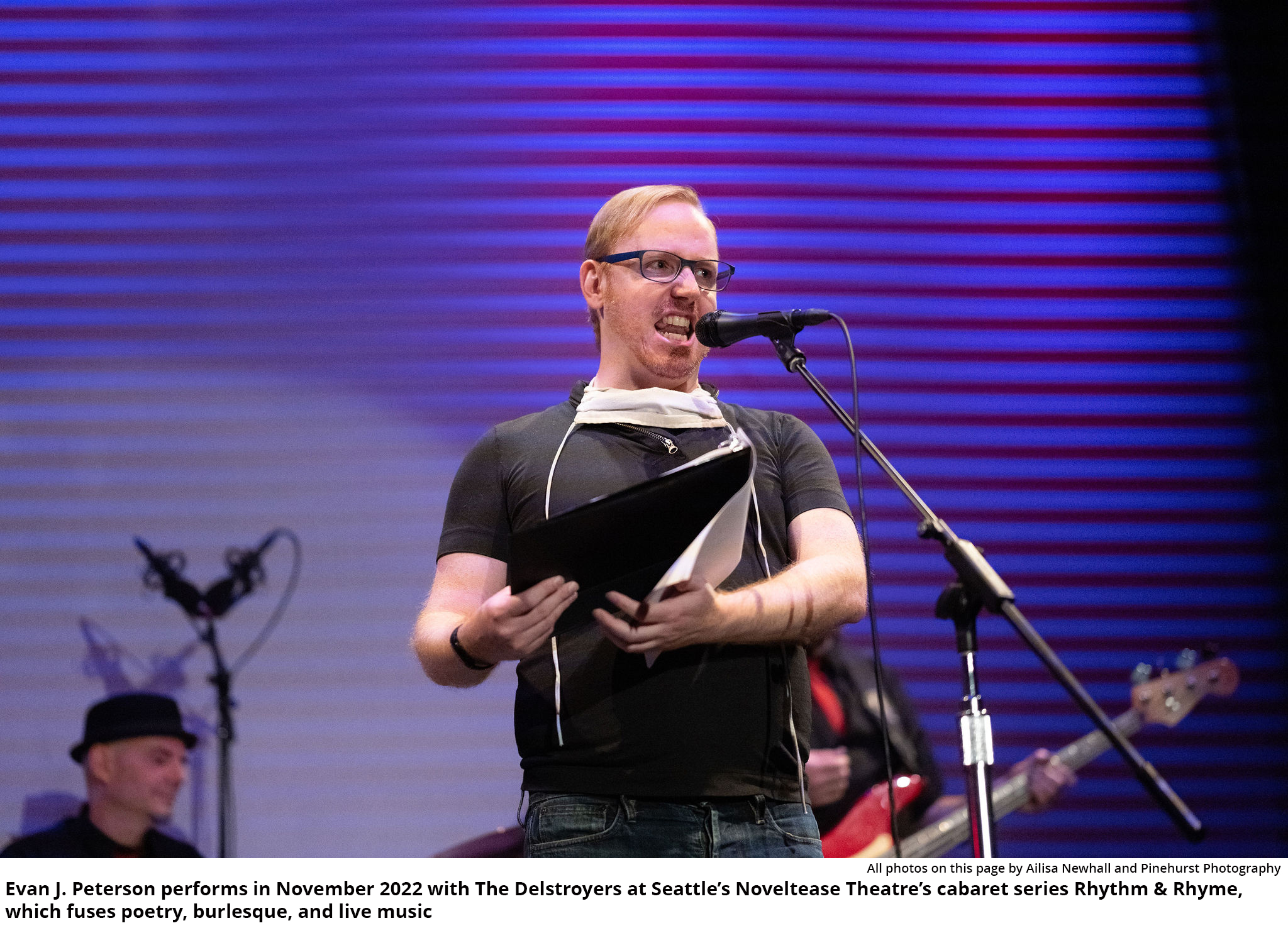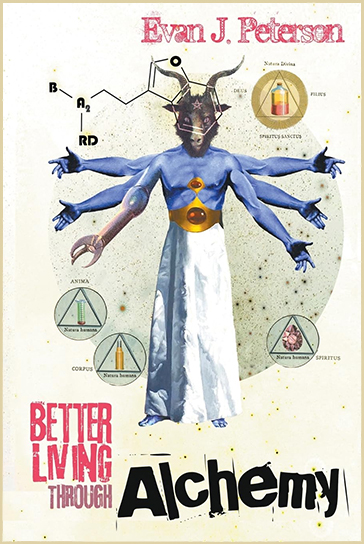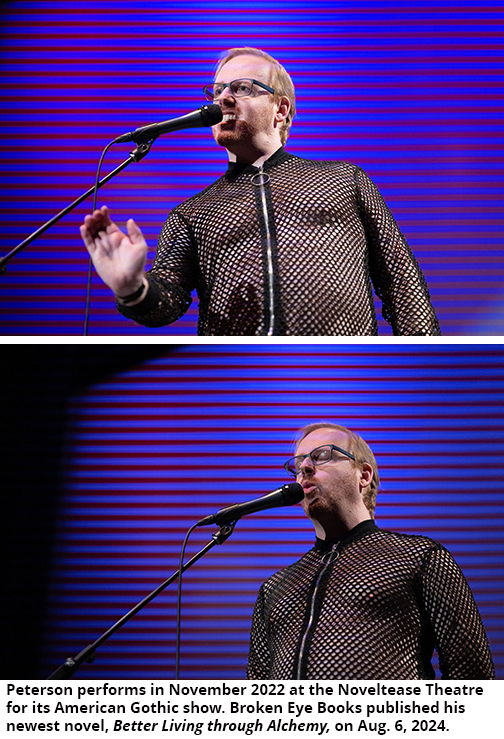Alumnus Evan J. Peterson: from student poet to becoming an author, a game writer, and a creator of stories and experiences
 By Emily Wilmot
By Emily Wilmot
Monsters, mutants, and outcasts have always captivated Evan J. Peterson, and he loves to write about them.
Peterson is a two-time alumnus of Florida State University’s Department of English, earning his Bachelor of Arts degree in 2004 in literature and his Master of Fine Arts degree in 2009 in creative writing.
Peterson grew his writing skills and career during his time in college, through friendships and mentorships that encouraged him to blossom into a writer of queer and horror stories that fascinate and disgust. In fact, this applies to his newest book, Better Living through Alchemy.
“I did not set out to write a noir or a mystery, but that's that was always how it was going to turn out, and I just didn't realize it,” he says. “I had a very clear vision of what it would look like when she stumbles into the place where they harvest this substance. I was looking at some of the ideas I had not written up yet for shorts, and I thought, oh, this would make a fun novel. I could spend a whole novel trying to get her from point A to point B.
“It was a really fun thing to write. And I feel very lucky and grateful that people love this book.”
Peterson was originally scheduled to read from Better Living through Alchemy on Sept. 10 for the English department’s Jerome Stern Reading Series, but personal circumstances prevented him from doing so.
Watching the X-Men and The Rocky Horror Picture Show in his youth pushed him toward the occult and the nuanced; when it came time to leave Miami and start his collegiate years, however, something else caught his eye.
“I went initially for the fashion design program, but also, I knew that it had a pretty solid arts program, and I just wanted to really spend more time in the artistic space in college,” he says.
For Peterson, however, the chance to explore his appreciation for writing was too compelling. He wrote everywhere he could, including down time in his dorm and while hanging out in various spots on campus. Poetry became his main outlet for expression, which he eventually honed when he signed up for English classes that led him to his writing community.
“I fell in with a group of writers who were mostly focused on poetry, but there were a few fiction writers in our little clique,” he says. “But a lot of us met through Dr. Ginny Grimsley, who taught Intro to Poetry, and then we moved up to classes with English Professor David Kirby.”
Peterson says Kirby’s classes had a great impact on him, and he was a willing part of Kirby’s “fan club.” In fact, they still keep in contact, 15 years later.
“I adore Dr. Kirby,” Peterson says. “He taught me a lot of course about writing, but he also taught me a lot about how to be a teacher and how to have a zany persona without losing any professionalism.”
Kirby recalls the last time he saw Peterson, who now lives in Seattle, and embraced his former student.
“He was wearing a purple corset. This was after a production of The Rocky Horror Picture Show,” Kirby says. “Since then, he's gone out to the West Coast and he remains one of the most inventive people I know, constantly improving himself.”
Grimsley was a visiting faculty member in FSU’s Creative Writing Program from 2001 to 2005. Prior to joining her and Kirby’s classes, Peterson thought writing was an individual sport. Through Grimsley’s classes, he made friends within the writing world and began writing within a community that built him up.
Those friends were his gateway into finding friends in the Pride Union, Women’s Student Union, and activists’ groups that became Peterson’s network. Inside the English department, Professor Diane Roberts became another influential academic mentor for Peterson.
“She’s an incredible personality. I love how she can be sly and snarky while still being appropriate,” he says.
These professors and others helped to bring Peterson to his master's thesis, The Cutting Room Floor, a deep dive into the complex and heartbreaking mind of Frankenstein’s monster. He writes poetry from the perspective of the creature, detailing his internal dialogue about the abuse he experienced from Frankenstein, his feelings about the media created from Mary Shelley’s story, and his mental decline as he nears death after 200 years of life.
"Then and now, Evan’s poetry is impressive for its enormous conceptual reach as well as its playfulness and humor,” says English Professor Barry Faulk, who was on Peterson’s thesis committee. “From the very start of his poetry career, he was committed to exploring the art form's performative possibilities; Evan's poetry readings are as entertaining and provocative as they are thought-provoking."
 Kirby was the director of Peterson's thesis, and English Professor James Kimbrell and English Senior Lecturer andf Distinguished University Scholar Barbara Hamby also were on his committee.
Kirby was the director of Peterson's thesis, and English Professor James Kimbrell and English Senior Lecturer andf Distinguished University Scholar Barbara Hamby also were on his committee.
Eventually, Peterson became a teacher himself, and he pulled knowledge from Kirby’s mentorship to use in his own classes.
“I still love teaching creative writing workshops online or in person, if there's the opportunity for that,” he says.
His undergraduate and graduate classes in the English department allowed him to combine his love for horror and poetry. Through writers whp combined those two genres, he began to see how he could use poetry to disgust and scare his audience. In this discovery, horror writer, director, and visual artist Clive Barker along with award-winning author Toni Morrison became major influences.
“[Clive Barker] has a way of being poetic in his horror writing that a lot of other horror writers never get to,” Peterson says. “[And] Toni Morrison is thought of as the pinnacle of American literature, [but] a lot of her work is quite dark, and she has no qualms writing about the horrors of life.”
In addition to Barker and Morrison, Peterson explored many authors and artists during his time in college, including Sylvia Plath, Shirley Jackson, Angela Carter, Neil Gaiman, Allen Ginsberg, David Bowie, and William S. Burroughs. He says inspirations for Better Living through Alchemy are Burroughs and film director David Cronenberg.
Burroughs is famous for his startling and unconventional tales of drug culture. Cronenberg is known as a trailblazer in the world of body horror and famous for his films that dive into gut-wrenching body transformations, creepy infections, and the wild mix of mind, body, and technology.
Better Living through Alchemy reflects some of those elements. Peterson also began combining his love for horror stories with queer stories, as his own identity began to appear in his writing.
“Queerness and monsters, it’s all about that outsider perspective, and there's just a kinship that a lot of queer people have with the monster characters,” he says. “And for me, it’s not even something that I can explain from a psychological theory; it’s just, I recognized something in them.”
Peterson continues to put the adventures in his mind onto paper.
Emily Wilmot is an English-Editing, Writing, and Media major, with a minor in economics.
Follow the English department on Instagram; on Facebook; and on X.
